Ministry of Jal Shakti
Secretary, Department of Drinking Water and Sanitation, Ms. Vini Mahajan Inaugurates National conference on JJM & SBM-G at Lucknow, Uttar Pradesh
JJM & SBM-G Have Reached Significant Junctions In Terms of Outputs & Focus Needs To Be On Sustainability: Union Minister for Jal Shakti, Shri Gajendra Singh Shekhawat
Working on JJM and SBM-G is a contribution that will make an impact on the lives of the weakest and most disempowered, who face the brunt of ill health and costs associated with it: Ms. Vini Mahajan
Posted On:
17 FEB 2024 3:37PM by PIB Delhi
The Secretary, Department of Drinking Water and Sanitation, Ms. Vini Mahajan inaugurated a National conference on Jal Jeevan Mission (JJM) and Swachh Bharat Mission - Grameen (SBM -G) in Lucknow, Uttar Pradesh on 16th February, 2024 with a ceremonial lamp lightening by, along with the other distinguished dignitaries. Spanning over two days, this conference is being attended by senior officials from all States/ UTs and senior officials from Department of Drinking Water and Sanitation (DDWS), under Ministry of Jal Shakti, Government of India. In the latter half of the day, the Union Minister for Jal Shakti, Shri Gajendra Singh Shekhawat addressed the participants. Shri Swatantra Dev Singh, Jal Shakti Minister of Uttar Pradesh; and Shri Ravi Kishen, Member of Parliament, Lok Sabha also graced the occasion.
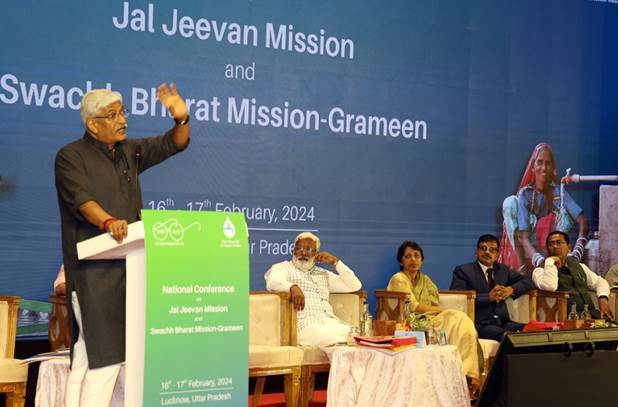
Shri Gajendra Singh Shekhawat spoke about the critical time of this conference which comes when both JJM and SBM-G have reached significant junctions in terms of their outputs and when the focus needs to be on sustainability. He highlighted the work and leadership and guidance of Prime Minister, Shri Narendra Modi for not only launching SBM but for leading and guiding it from the front. His approach whilst working on SBM-G was focused on ‘swachhata ka samman, sanyuktah ki shakti’ which was the way for swachhata. He said, “The work we do in SBM-G and JJM which must be done in mission mode when we are addressing the concern of saturation, however whilst discussing program sustainability, then conferences of this nature become important. The work we do on water is ‘pure’ and the way forward needs to be focused on engaging the public and making it people’s movement which not only enhances program uptake but also program sustainability. He spoke about the transformative missions- JJM & SBM that need to continue the work for Sampooran Swachhta which must look at program convergence; enhanced quality control measures for procurement and implementation; and a passionate commitment from all involved with the work to be the change we want to see in this country.”
Shri Swatantra Dev Singh cited on how the state of Uttar Pradesh had made remarkable progress under the visionary leadership of the Prime Minister Shri Narendra Modi and the Chief Minister of Uttar Pradesh, Yogi Adityanath. Shri Ravi Kishen expressed his pleasure to be a part of the conference. He congratulated the DDWS for the progress made in JJM and SBM-G and said that the missions have reached the last mile in line with the visionary objectives set by the Prime Minister and the Chief Minister.
The Secretary, Department of Drinking Water and Sanitation, Ms. Vini Mahajan, addressing the gathering after inaugurating the conference asserted, “Working on JJM and SBM-G is a contribution that will make an impact on the lives of the weakest and the most disempowered, who face the brunt of ill health and the costs associated with it”. She emphasised maintaining the water supply systems and to work out systems that will build the capacities of the utilities that have been already created. She urged everyone to take cognizance of the costs that will help in sustaining and strengthening the schemes through effective operation and maintenance (O&M) while ensuring water quality standards are met and the systems keep running day-after-day and year-after-year.
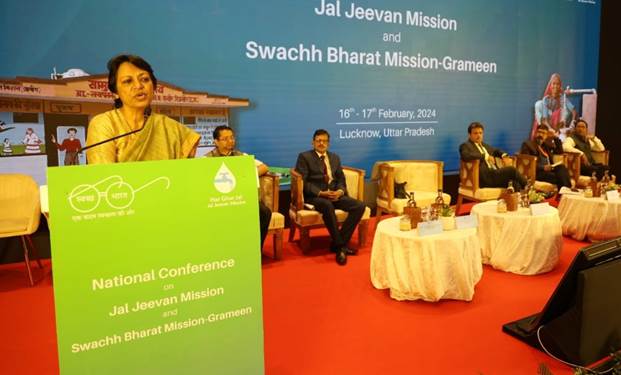
She further emphasised the transformative impact of SBM-G and JJM across 6 lakh villages. Stressing the importance of effective O&M, she urged a shift toward empowering local communities for sustained infrastructure management. Highlighting challenges such as water quality and non-biodegradable waste, grey water, she called for inter-departmental convergence and shared learning. The Secretary encouraged open dialogue, urging participants to share successful practices and seek collaborative solutions for the WASH sector's comprehensive development." She expressed her happiness and privilege for the opportunity to work on the two significant Missions for rural populations; JJM and SBM-G. She extended her appreciation to all the States/ UTs for their efforts and contribution, leading to increased coverage of Functional Household Tap Connections (FHTCs) in the rural households of India.
Her address was followed by panel discussions on the WASH sector and related best practices. The panelist comprised of AS&MD-NJJM; JS&MD-SBM (G); Special Chief Secretary – Govt of Assam; Additional Chief Secretary, Govt. of Karnataka; Principal Secretaries and WASH experts. Day 1 sessions of the conference broadly covered topics such as WASH Sector in India, Best Practices in WASH Sector and Sustainability of Schemes.
Shri Atul Kumar Tiwari, Secretary – Ministry of Skill Development and entrepreneurship also joined the conference and spoke about how skilling of manpower can lead to the sustainability of the schemes.
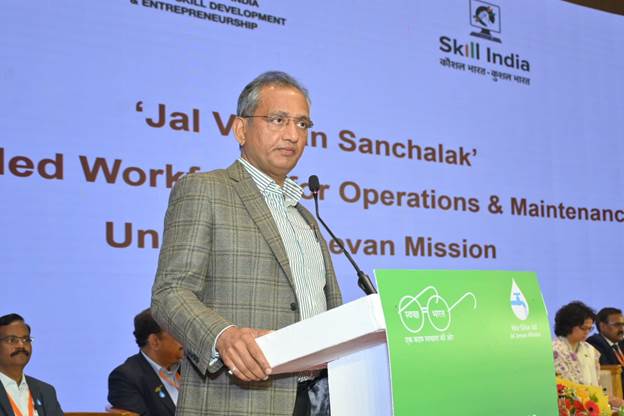
Shri Chandra Bhushan Kumar, AS&MD-NJJM started by sharing a story of Mushi Premchand, emphasising on the fact that water has multiple sources and multiple uses. This understanding needs to be taken into account while strengthening the water supply management systems. He underscored the need for localised solutions and innovations, adapting to varied geographical conditions throughout the length and breadth of the country. He further stressed on the need to sustain the infrastructures by engaging skilled/ multi-skilled human resource on ground to carry out repair and maintenance works.
Shri Jitendra Srivastava, Joint Secretary and Mission Director (SBM-G) said, “In the journey of SBM- G Phase II, India transformed from facing 60% of the world’s open defecation stigma in 2014 to achieving ODF status in 2019. Today, nearly 90% of our 5.91 lakh villages are ODF+, but the real challenge lies in making the remaining 75% of them Model villages. To achieve this, a Jan Andolan must be fostered, leveraging community involvement, especially empowering women. Ensuring ODF sustainability involves not just infrastructure, but also addressing emerging issues like faecal sludge management and menstrual hygiene. Our comprehensive strategy must extend beyond infrastructure to ensure sustainability, responsible tourism, and continual usage of sanitation facilities in schools and health centers.”
Towards the end, the panel discussions were opened to an interactive Q&A session, wherein the experts answered questions from the participants on O&M, contamination and sustainability of schemes. The day also witnessed the release of five documents by the Union Minister in the presence of the distinguished guests and dignitaries. List of releases is as under:
- Jal Jeevan Mission Compendium of Behavioural Best Practices: A Comprehensive Insight into Progress and Achievements
- Behavior Change Communication Strategy: Shaping the Future through Awareness
- Swachhata Chronicles: Transformative Tales from India- Vol. II: A collection of best practices from the community where impactful change continues to unfold for SBM-G.
- ‘Swachhata Green Leaf Rating (SGLR)’ System Booklet that is a benchmark index encompassing responsible sanitation across SBM-G aspects
- Compendium on Liquid Waste Management (LWM) Technologies: A consolidated booklet of approved technologies, operational guidelines, and successful case studies, providing a knowledge bank for stakeholders on LWM, serving as a guide, fostering a cleaner and healthier rural environment.
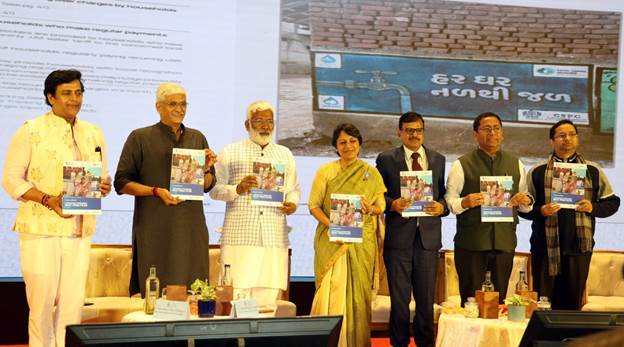
In addition to the documents, Shri Gajendra Singh Shekhawat also launched the ‘Citizen Corner’. The 'Citizen Corner' puts the ability to manage water quality and supply directly into the hands of the citizens. The tool is a one-stop solution with an easy interface to know about water quality of a village and all other water supply information at fingertips.
One of the key highlights of the workshop was the special Digital Display section, meticulously designed to highlight innovative solutions, cutting-edge technologies, and best practices within the WASH sector including JJM and SBM-G. This section offered participants an immersive and interactive experience, granting a comprehensive overview of the significant advancements and successes achieved across various States/ UTs. The Digital Display was divided into three distinct areas:
1. Digital Hut: This installation provided a deep dive into the progress of Jal Jeevan Mission and SBM-G, presenting insights on the progress water quality, the strengths and interventions of different states, and the role of digital technologies in enhancing the mission's impact. The hut showcased the sanitation journey from 1947, highlighting the guidance of Prime Minister in the SBM journey and provided an interesting overview of the success of the SBM-G program verticals including impact details and milestones. It served as an educational platform, showcasing the collaborative efforts and milestones achieved in ensuring water accessibility.
2. Video Wall - RWPF Partners: Dedicated to the Rural Water and Sanitation Partners Forum (RWPF) partners, this video wall highlighted the on-ground activities and efforts that have been instrumental in the success of JJM and SBM-G. Through engaging visuals, attendees could witness the dedication and hard work of various organizations and their contributions to making clean water accessible in rural areas.
3. Video Wall - State Initiatives: Focused on showcasing state-specific initiatives related to Operations & Maintenance (O&M) and other aspects of JJM, this video wall provided a platform for sharing success stories and learning opportunities.
The Digital Display section attracted the attention of the Union Minister and other dignitaries who walked through the display with great interest and appreciation.
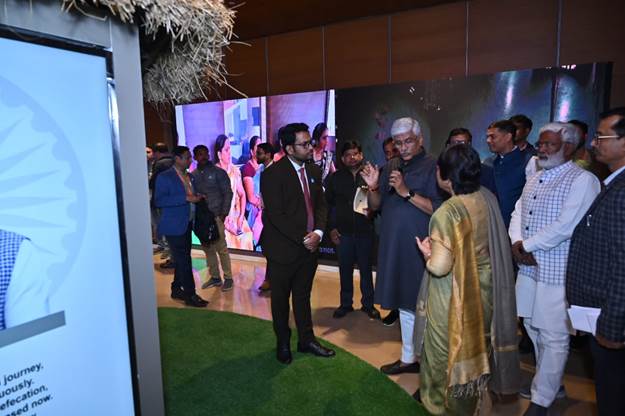
The National Conference on Jal Jeevan Mission and Swachh Bharat Mission (G) has set a precedent for future collaborations and innovations in the WASH sector, paving the way for sustainable and inclusive growth in rural India.
*******
Anubhav Singh
(Release ID: 2006765)
Visitor Counter : 1964